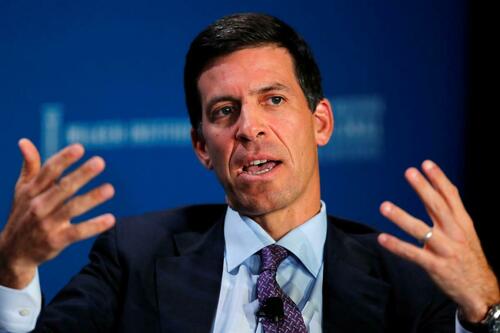Goldman President Complains Overly “Political” Fed “Does Not Have The Will” To Stop Inflation
Shortly before the start of yesterday’s Fed announcement, Goldman Sachs No. 2 John Waldron, the investment bank’s president and a Wall Street insider if there ever was one, apparently decided to vent his frustrations with the Powell Fed in front of a live (if virtual) audience at a meeting of the New Jersey State Investment Council, and (apparently) one Bloomberg journalist.
During what the reporter later characterized as a rant encompassing many of the Fed’s failures in responding to the COVID pandemic, the senior Goldman banker complained that the Fed’s political “independence” has been hurt, which in turn has weakened its credibility with markets. For a preview of how this could play out in the long term, just take a look at how successful Turkey’s central bank has been at enforcing price stability.
The problem is that, thanks to its newfound political bearings, the Fed is more reluctant to take dramatic but ultimately necessary action for fear of damaging its public image (and also giving lawmakers reason to start another round of Fed bashing).
What’s gone on in the past couple of years has brought “into question the independence of the Fed,” Waldron said hours before the Fed’s meeting Wednesday. He questioned the Fed’s strength to act as an “independent, monetary policy engine that is doing what it thinks is right and not what’s expedient.”
“They have a chance here to do that, but I am a little worried about whether they’ll stand up and do it,” Waldron said at a virtual meeting of the New Jersey State Investment Council, where he was a speaker.
As BBG pointed out, the comments represented a “rare jab” by a senior banker. Typically, megabank executives carry water for the Fed by (among other things) appearing on CNBC to proclaim that they have complete confidence in the Fed’s ability to “thread the needle”, as JPM CEO Jamie Dimon recently put it. Even Waldron’s old boss, Lloyd Blankfein, took a break from retirement to make an appearance on “Squawk Box” the other day.
Waldron was reportedly responding to a question about whether the Fed will be able to continue with its planned tightening regimen should markets rebel (as they have). The Goldman banker also said in his reply that he was “not entirely convinced” the Powell Fed would have the nerve or the will.
While rate hikes are interesting and relevant, the executive said, what really matters is the ability and willingness to trim its balance sheet that has more than doubled in the last two years to almost $9 trillion.
“I’m not entirely convinced the Fed has the will to do it,” he said, adding that bond traders share his view. “I’m not sure they believe the Fed has the will either.”
Just hours after these comments, Powell tried to dispel the image that he has been too soft on inflation by delivering a decidedly hawkish Q&A where he stressed that the central bank wouldn’t hesitate to react aggressively if price pressures don’t subside. The FT summed up Powell’s tone in the title of its report on the briefing: “No more Mr. Nice guy”
While Dems might like to blame President Trump for the Fed’s newfound sensitivity to politics, President Joe Biden said just the other day that it’s the Fed’s job to stop inflation. Waldron also blamed the central bank for exacerbating economic inequality with a policy mix that at times seemed geared toward inflating asset prices (to the benefit of asset owners).
Waldron blamed Fed policies for the growing divergence in the fortunes of the rich and the poor, saying that those who already had wealth benefited by the monetary actions over the last decade. “Central bank policy has exacerbated inequality,” he said.
How might the Fed fix this? Waldron isn’t exactly optimistic about Fed Chair Jerome Powell’s ability to do what’s necessary to stop inflation. Unfortunately, there’s really only one man for the job: former Fed chairman Paul Volcker. Even more unfortunately: he died in December 2019 (ironically just months before the Fed unleashed its post-COVID easing).
He pointed to Paul Volcker, who led the Fed’s brute-force campaign against inflation in the late 1970s and early 1980s. Back then, the Fed raised interest rates by several percentage points in one go, leading to some of the fiercest public protests and political critiques of the central bank in its history. But, ultimately, the policies were widely credited with stabilizing the U.S. economy.
“We might need to bring back Paul Volcker,” Waldron said. “And have somebody that would be willing to kind of stay the course without regard to exactly what’s going on in the markets.”
The fact that a top executive at America’s most powerful bank would rather have a zombie leading the Fed than Jerome Powell is hardly a vote of confidence.
Then again, it’s also extremely possible that Waldron was simply talking his (or rather, his employer’s) book: Goldman has been selling billions of dollars in US equities in recent quarters (while its chief stock-market talking head David Kostin continued with his permabullish notes urging clients to BUYBUYBUY).
Of course, if Goldman wants to make money selling equities, it needs to convince somebody else (preferably retail) to buy. That’s just common sense.
Tyler Durden
Thu, 01/27/2022 – 15:21
via ZeroHedge News https://ift.tt/32C0CpU Tyler Durden
